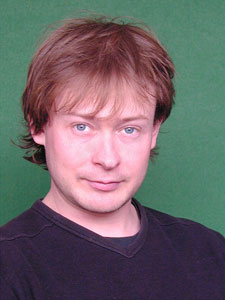
ATLAS e-News
23 February 2011
In memoriam - Steve Dallison
16 June 2009

Steve Dallison, 1974-2009
Steve Dallison joined the ATLAS group at RAL at the end of 2004, after a PhD on the OPAL experiment at Manchester and a first degree at Swansea University. In ATLAS Steve first worked with Roger Clifft and Alan Poppleton at CERN on the ID tracking software, and he gave a talk on the performance of that software at the big ATLAS Physics meeting in Rome in June 2005. That talk was a reference point for the performance of the tracking software for quite some time; the small shift in reconstructed momentum that Steve showed in Rome was an irksome problem for many months afterwards, which was finally traced to a problem in the way the GEANT4 tracking was done.
He continued his work on tracking, particularly for studies with the b-physics group, but he also became one of the first serious users of the ATLAS Run Time Tester (RTT), providing much feedback and help to the UCL RTT developers. When Steve started on RTT there were just a handful of nightly runs, few of which ever completed: the RTT now runs hundreds of jobs most nights. Towards the end of 2007, Steve moved to a permanent position supporting particle-physics computing at RAL, putting his Linux and Grid expertise to excellent use.
In summer 2007 Steve was diagnosed with kidney cancer and was told he had just a few months to live. Steve’s quiet, gentle demeanour didn’t change, but it brought out something else in him. He became a resolute fighter against the disease itself and against the UK health bureaucracy that, at first, denied him the latest drugs. At the time the availability of the latest cancer drugs and therapies was something of a scandal in the UK health system: in some areas they were available for some patients, but the system was chaotic and profoundly unfair.
Steve threw himself into the campaign, talking to local and national media, appearing on TV, and giving evidence to parliamentary enquiries. There was considerable coverage of Steve’s efforts at the time and again after he died. (A selection of links is given at the end.) Thanks to his efforts and those of many others the system is now much improved; a lasting legacy. Steve got the drugs, but the disease spread, and despite further operations and treatments he lost his battle for life and passed away in hospital in Oxford on May 23rd. Because of the way he fought his illness, because we had all seen him quite recently, the sudden end came as great shock.
Throughout his illness Steve drew much strength from the support and love of his girl-friend Olivia. They had planned to marry this July. We were all moved to learn that they were able to marry, in hospital, just before the end.
Steve made many contributions to ATLAS, particularly in software and computing, but he was always interested in fundamental questions of physics. Through his work helping Bill Scott at Rutherford to get to grips with ATLAS software, Steve and Bill started working on a new way to represent the CKM matrix. Together with Paul Harrison from Warwick they have just finished the paper: please take a look.
All Steve’s friend and colleagues will miss a kind, gentle person, who died much too young, and remember the courageous way he fought his illness, for himself and for others. We extend our deepest condolences to his mother, his brother, Olivia, and all his family.
UK media coverage:
BBC
Abingdon Herald
Oxford Mail
The Sun
Norman McCubbin, on behalf of Steve’s friends and colleagues at RAL and in ATLAS |
Rutherford Appleton Laboratory |